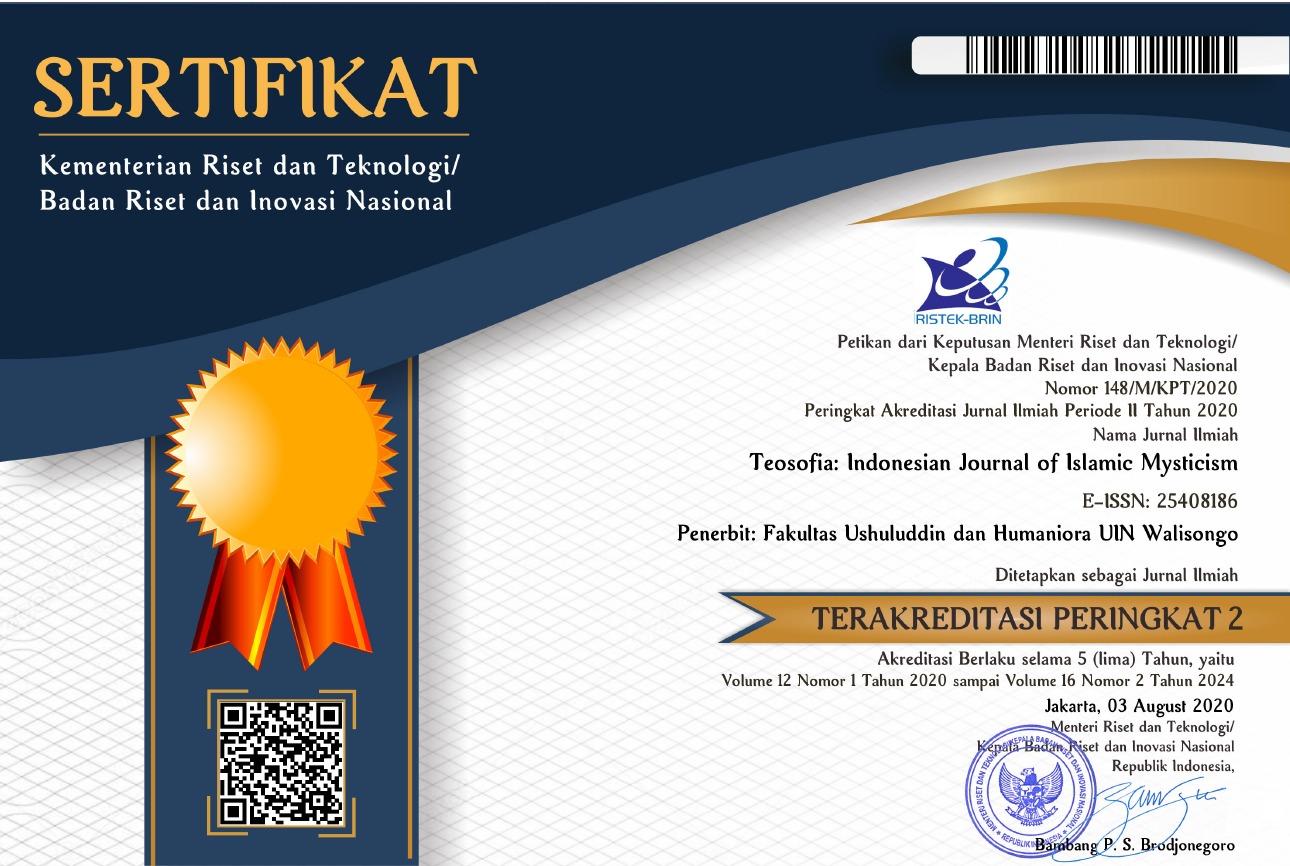SUFI EDUCATIONAL TENETS: Practical Encounters of Sufi Teachings and Educational Curricula
DOI:
https://doi.org/10.21580/tos.v5i1.1720Keywords:
concept, education, Sufism, characterAbstract
This research focused on Sufism of ‘Abdul Wahab al-Sya’rani and studied about the education components which covers: the aspects of purpose and teaching material, the aspects of teacher and students, the aspects of method and strategy in Sufism Education, as well as the relevance of Sufism education by as-Sya’rani with the development of character building. The objectives of this research are: a) To describe what the objectives and teaching materials in Sufism by as-Sya’rani are; b) To describe how the position of the teacher and students in Sufism education by as-Sya’rani is; c) To describe what the method in Sufism education by as-Sya’rani is; d) To describe how relevant the Sufism by as-Sya’rani with the development of character building is. This qualitative research uses hermeneutic approach. The analysis method used in this research is content analysis with the descriptive features. The writer uses the hermeneutic approach because he efforts to describe the facts gained from text containing as-Sya’rani’s thoughts on Sufism education and performs the perception towards the sense of texts in effort to be possibly close to understand the idea of as-Sya’rani’s Sufism education.
Downloads
References
Azra, Azyumardi, Esei-esei intelektual Muslim dan pendidikan Islam, Jakarta: Logos Wacana Ilmu, 1999.
Bosworth, Clifford Edmund, The Encyclopaedia of Islam, Leidien: Brill, 1997.
Kartanegara, Mulyadhi, Menyelami Lubuk Tasawuf, Jakarta: Erlangga, 2006.
Kuhn, Thomas S, Peran Paradigma Dalam Revolusi Sains, Bandung: Remadja Karya, 1989.
Manẓūr, Muḥammad ibn Mukarram Ibn, Lisān Al-’Arab, ed.12, Bairut: al-Dār al-Maṣriyat Al-Tālīf Wa-Al-Tarjamat, 1966.
Mulkhan, Abdul Munir, Satu Tuhan seribu tafsir, Yogyakarta: Kanisius, 2007.
Najjar, Amir, Psikoterapi Sufistik Dalam Kehidupan Modern, Bandung: Hikmah, 2004.
Al-Sya’rāni, Abdul Wahab, Al-Anwar Al-Qudsiyah Fi Ma’rifati as-Ṣūfiyyah, Bairut: al-Maktabah al-Ilmiyah, 1992.
_________, Beranda Sang Sufi, Bandung: Hikmah, 2003.
_________, Cahaya Suci Pada Pintu-Pintu Surga, Adab Bertasawuf Dalam Bingkai Syar’i, Surabaya: Risalah Gusti, 2011.
_________, Lawāqiḥ Al-Anwar Al-Qudsiyah Fi Bayāni Al-Uhud Al-Muhamadiyah, Beirut: Dar al-Kotob al-Ilmiya, 1998.
_________, Lawāqiḥ Al-Anwar Al-Qudsiyah Fi Ma’rifati Qawāid as-Ṣūfiyah, Beirut: Dār al-Fikr, 1996.
Syukur, M. Amin, and Fathimah Usman, Terapi Hati Dalam Seni Menata Hati, Semarang: Pustaka Nuun Dan Lembkota, 2009.
Tanwil, Taufiq, At-Tasawuf Fi Misr Aban Al-Asr Al-Uśmāni, Cairo: al-Hai’a al-Misriyya, n.d.
Zohar, Danah. Spiritual Intelligence: The Ultimate Intelligence, New York: Bloomsbury Publishing, 2012.
Downloads
Published
How to Cite
Issue
Section
License
Copyright
The copyright of the received article shall be assigned to the journal as the publisher of the journal. The intended copyright includes the right to publish the article in various forms (including reprints). The journal maintains the publishing rights to the published articles. Therefore, the author must submit a statement of the Copyright Transfer Agreement.*)
Licensing

This work is licensed under a Creative Commons Attribution-ShareAlike 4.0 International License.
In line with the license, authors are allowed to share and adapt the material. In addition, the material must be given appropriate credit, provided with a link to the license, and indicated if changes were made. If authors remix, transform or build upon the material, authors must distribute their contributions under the same license as the original.
_______
*) Authors whose articles are accepted for publication will receive confirmation via email and send a Copyright Transfer Agreement.









